Science
'It's almost shameful to want to have children'

Jade S. Sasser is an associate professor in the Department of Gender & Sexuality Studies at UC Riverside. Her research explores the relationships between reproductive justice, women’s health and climate change, and she’s the host of the podcast “Climate Anxiety and the Kid Question.” The following excerpt is from her newest book, “Climate Anxiety and the Kid Question: Deciding Whether to Have Children in an Uncertain Future,” which was published earlier this year.
The kid question. It comes up over and over again in the form of family questions and expectations. It arises in conversations with peers, partners and new dates. It appears in the quiet times, sitting in the spaces where our wildest hopes and deepest fears collide.
American society feels more socially and politically polarized than ever. Is it right to bring another person into that?
In 2021 and 2022, I conducted a series of interviews on this topic with millennials and members of Generation Z, all of them people of color. Some grew up in low-income families and neighborhoods while others were from the middle- or upper-middle class. Some of them identify as queer, or their close family members and friends do, which shapes their sensitivity to discrimination against gay, lesbian, bisexual, and transgender people.
These interviewees have more climate change knowledge than most people do. All of them are college-educated; most of them either grew up or have lived for some time in Southern California; and most have taken environmental studies classes, either as undergrads or in graduate school.
Their experiences as members of marginalized groups have shaped their experiences with climate emotions like anxiety, fear, and trauma — as well as hope and optimism. Paying closer attention to those emotions and mental health in communities of color, including how they shape reproductive plans, will become an increasingly important component of climate justice in the United States.
Bobby
Bobby, 22, considers himself an environmentalist. He recently graduated from college in Southern California with a degree in sustainability studies. His family is Guatemalan American.
Bobby is both confident that he will become a parent one day and also certain that he won’t bring his own biological kids into the world. His thoughts about the environment, the future, and parenting come into sharp relief through his current job at a restaurant, where he is unhappily employed. “There’s so much being wasted that could be returned to the earth.”
He connects these waste issues to carbon emissions and how he feels about having children. For Bobby, this is an ethical issue, a reason why he should not have biological children:
“I’m worried about what they would have to deal with growing up. I was already a young adult when I started to think about these things, but for them, at a young age they’re going to have to think about the environment and the fears that come along with pollution.
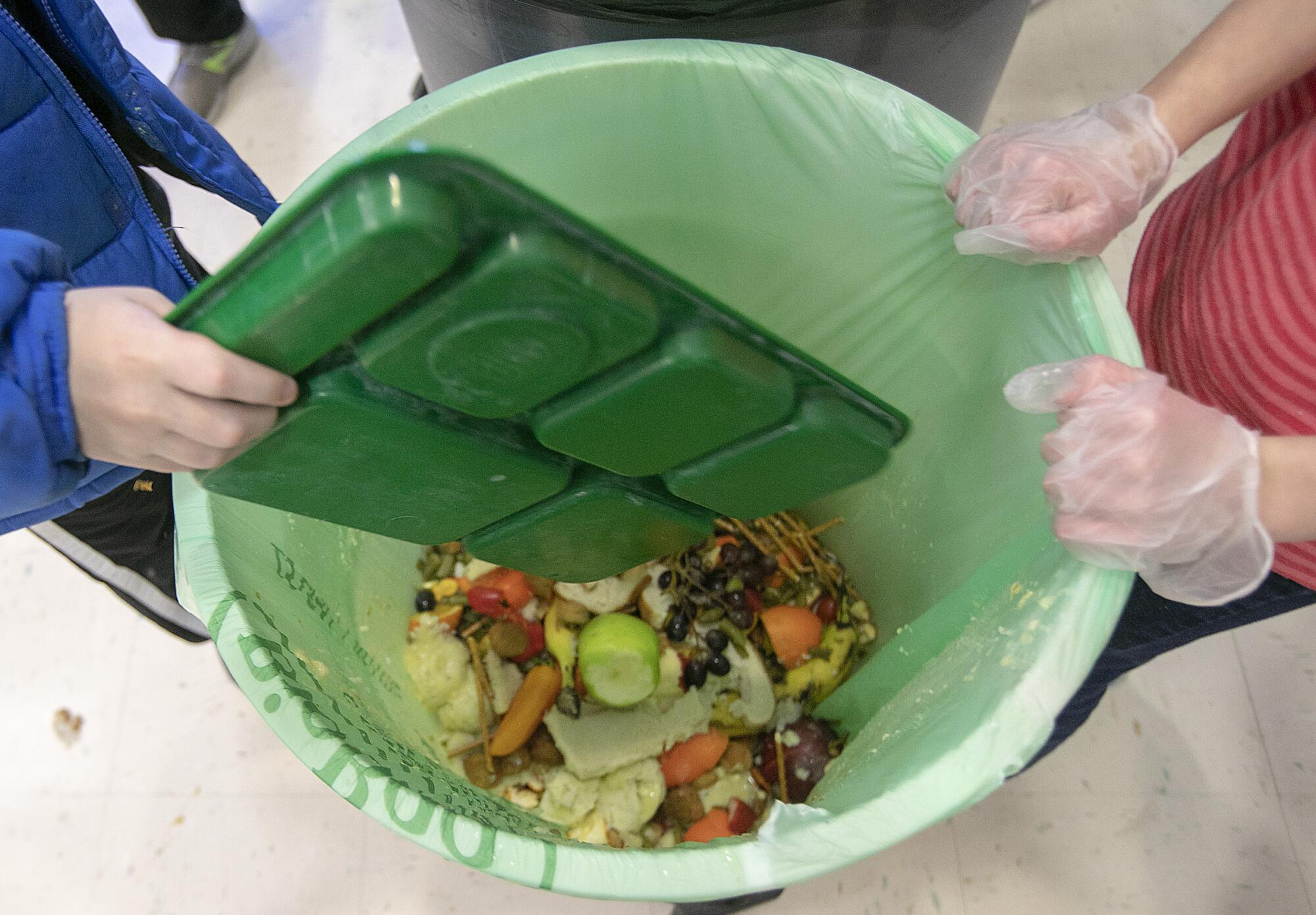
Students discard food into a bin as part of a lunch waste composting program at an elementary school.
(Associated Press)
“This is why I’m leaning more toward a foster kid, and maybe eventually adopting them. Because it wasn’t my choice to have that kid, but I can help guide them to have a better life. … The environment is really the deciding factor for me.”
Although he always wanted to have children, his thoughts about fostering arose from taking environmental studies classes. “Going into college was the first time I was exposed to this information firsthand, and I realized for the first time, it’s not all rainbows and sunshine. I had never learned before … about things like food waste and carbon emissions. And that’s when the gears started turning in my head about the future and what I wanted to do.”
Victoria
Victoria is the same age as Bobby; she graduated from the same university and is also from an immigrant family, though hers is from Ghana. In Victoria’s house there were four siblings and half a dozen cousins who were always around. As a result, Victoria really cherished the closeness and security of a large family.
“I guess in the future, I would love to have children,” she says. “I’d really like to have a big family. I grew up in a big family, so it’s nice.”
Victoria is interested in perhaps adopting or fostering, and she also connects the desire for this to her undergraduate education in environmental topics.
“I got a degree in sustainability, and I’ve always questioned bringing people into an environment [where] so much is going on politically, socially, health-wise, all of that. I always thought I wanted to give birth, but the more I look at foster care, I realize that I don’t need to physically have children to experience being a mom… . It’s a little selfish on my end to think I’m going to have all these kids when there are already kids in the world who would probably make me a better parent.”
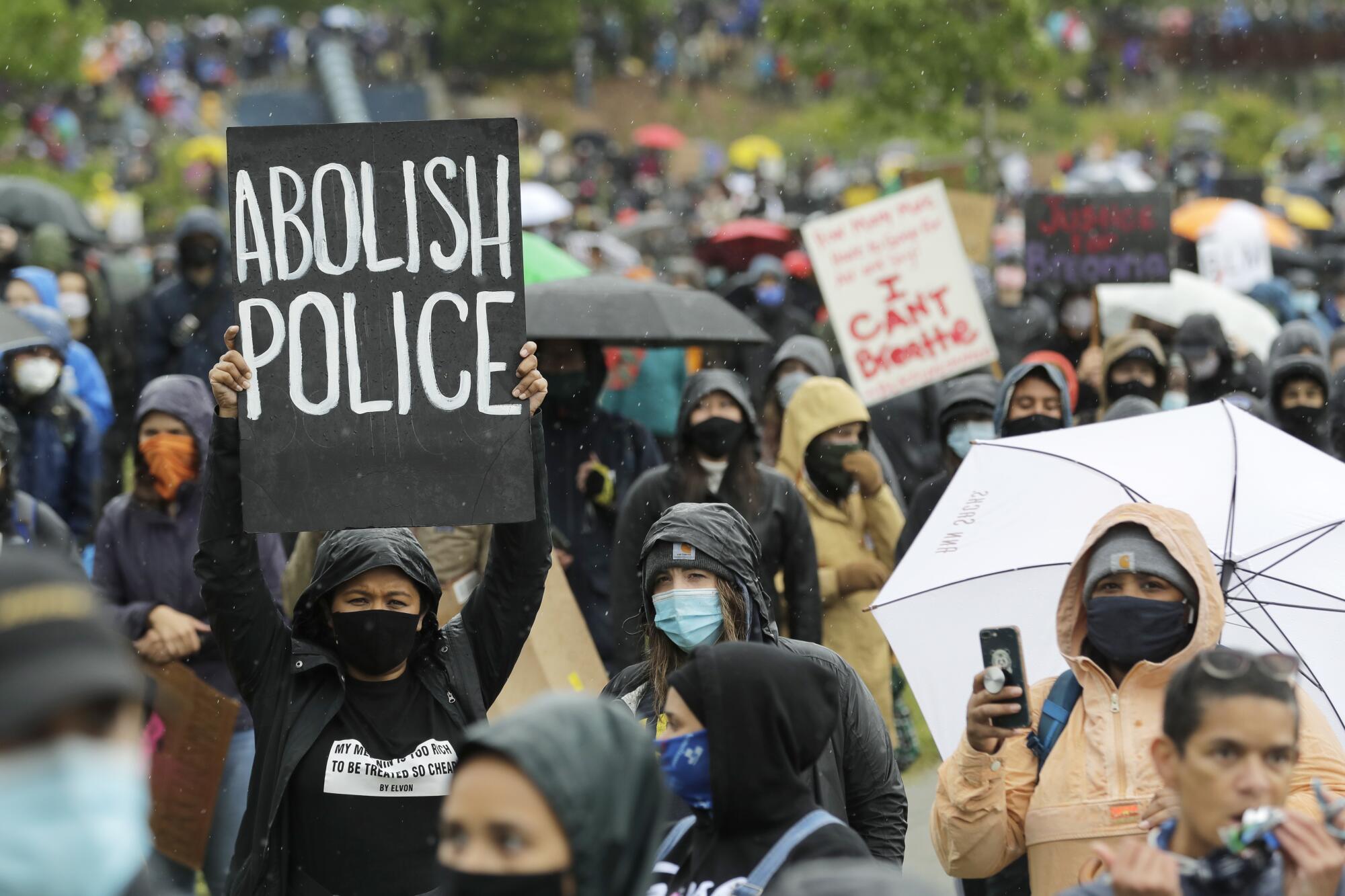
Protesters hold a “silent march” against racial inequality and police brutality that was organized by Black Lives Matter Seattle-King County in June 2020.
(Associated Press)
Victoria’s concerns about biological children are multifaceted: She worries about the future of healthcare access, wealth inequality, and whether her children would receive a low-quality education or be racially tracked in public schools. Ultimately it comes back to how racial inequality interacts with other social challenges to heighten her own sense of vulnerability and that of her potential future children.
“If I have children, they will be Black children,” she says. “It isn’t self-hatred. I love being Black, but the things I’ve gone through I wouldn’t wish on other children.”
This is a frequent topic of conversation among Victoria and her friends. They talk about whether they want to have children in the future. Most of them do not.
That feeling of being traumatized by an awareness of ongoing racial inequality shaped the perspectives of a group of Black women I spoke to. They were different ages, from their 20s to their late 30s, and they ranged from just starting out to having established careers. However, each perceived herself, and the prospect of becoming a mother, through the lens of vulnerability.
Rosalind
Rosalind, 38, is a Black woman of Caribbean origin living in Southern California. She has a graduate degree, a job as a scientific researcher, and is settled in a community she likes. Nevertheless, thoughts of the future are a heavy, ever-present burden. When I ask if there is one issue that feels like the primary reason for not having kids, she answers decisively: racism.
“With all of the anti-Black violence, and the police violence against us, it just seems so unsafe. And I see so many of my friends who do have children that are constantly stressed because of this, especially the ones who have teenage boys who are taller than average. They send their kids out there and then just spend their time worrying about whether their child is going to be targeted or harassed in some way, or potentially killed. I just don’t think I have the disposition to put up with that kind of stress.”
Melanie
Melanie, a 26-year-old Native American woman, was raised on the Navajo reservation and in Southern California. She idealizes having a big, happy family, but there are aspects of the world that give her pause, so she struggles with whether it’s morally OK to have children.
“ I think I may not have children although I do want them,” she notes. “Just because, with all of the things we see going on in the world, it seems unfair to bring someone into all of this against their will.”
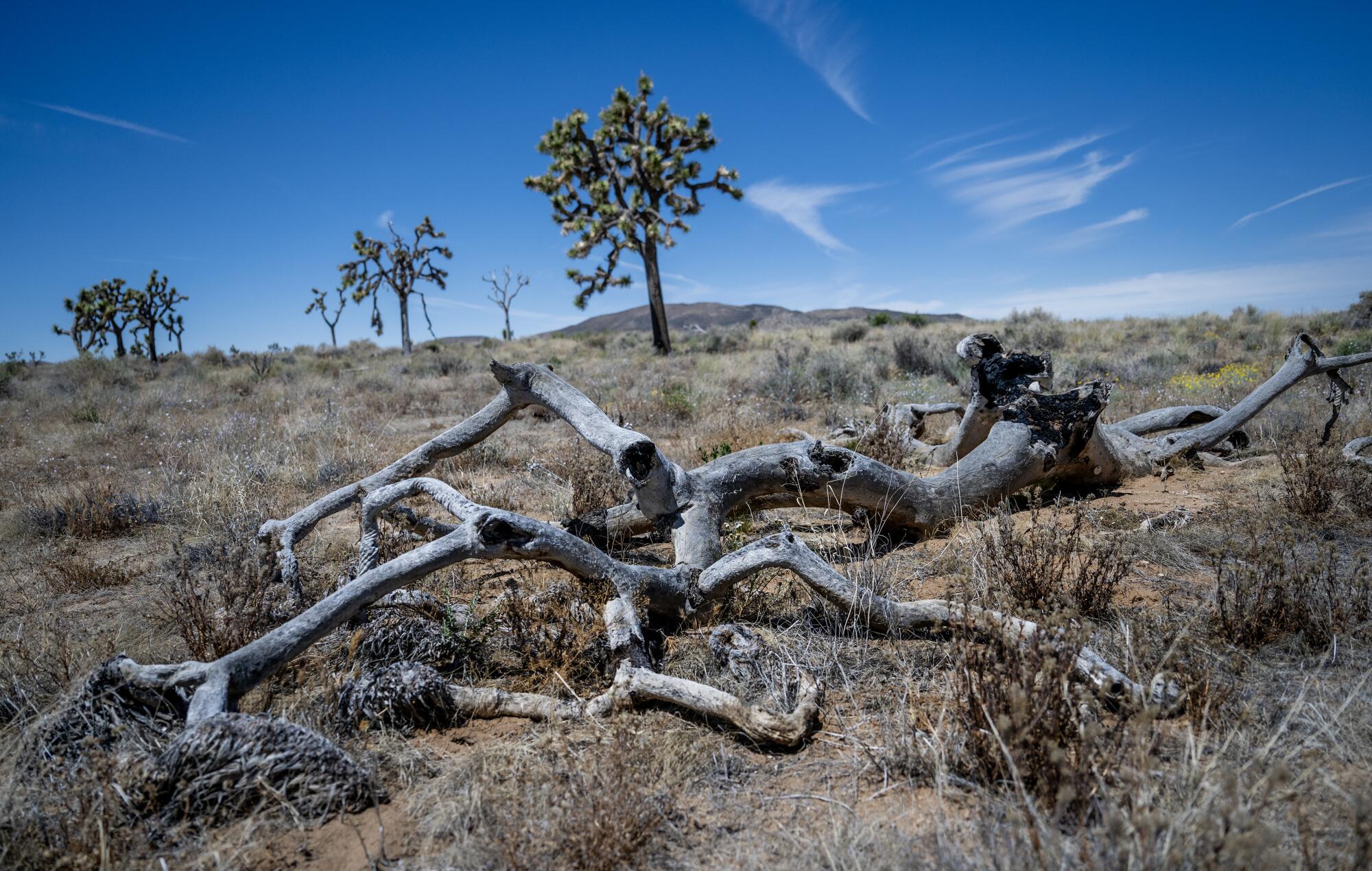
Drought last year took a toll on Joshua trees at Joshua Tree National Park.
(Gina Ferazzi / Los Angeles Times)
Melanie’s feelings about climate change include a general sense of powerlessness and lack of control over other people’s actions, which directly translates into her fears about parenthood: “With climate change, we’re the driving force of things breaking down, but then also, the planet’s going to do what the planet’s going to do. … So … it almost feels, like, kind of shameful to want to have children.”
Juliana
Juliana, a 23-year-old Mexican American woman, is strongly aware of negative peer pressure from friends. She recently graduated from art school, and her friend circle is mainly composed of queer and transgender, anti-establishment artists. Most of them have no intention of having children of their own, which seeps into conversations with Juliana.
Her friends cite environmental and mental health concerns. Their anxiety tells them that they can’t properly take care of themselves, much less a child. They also struggle, as trans and nonbinary people, with the issues of access to fertility centers and the need to use reproductive technologies that feel out of reach.
Juliana feels that it may be unfair for her to consider having biological children. She tells me that these feelings are not entirely separate from how she feels about what her child’s racial upbringing would be.
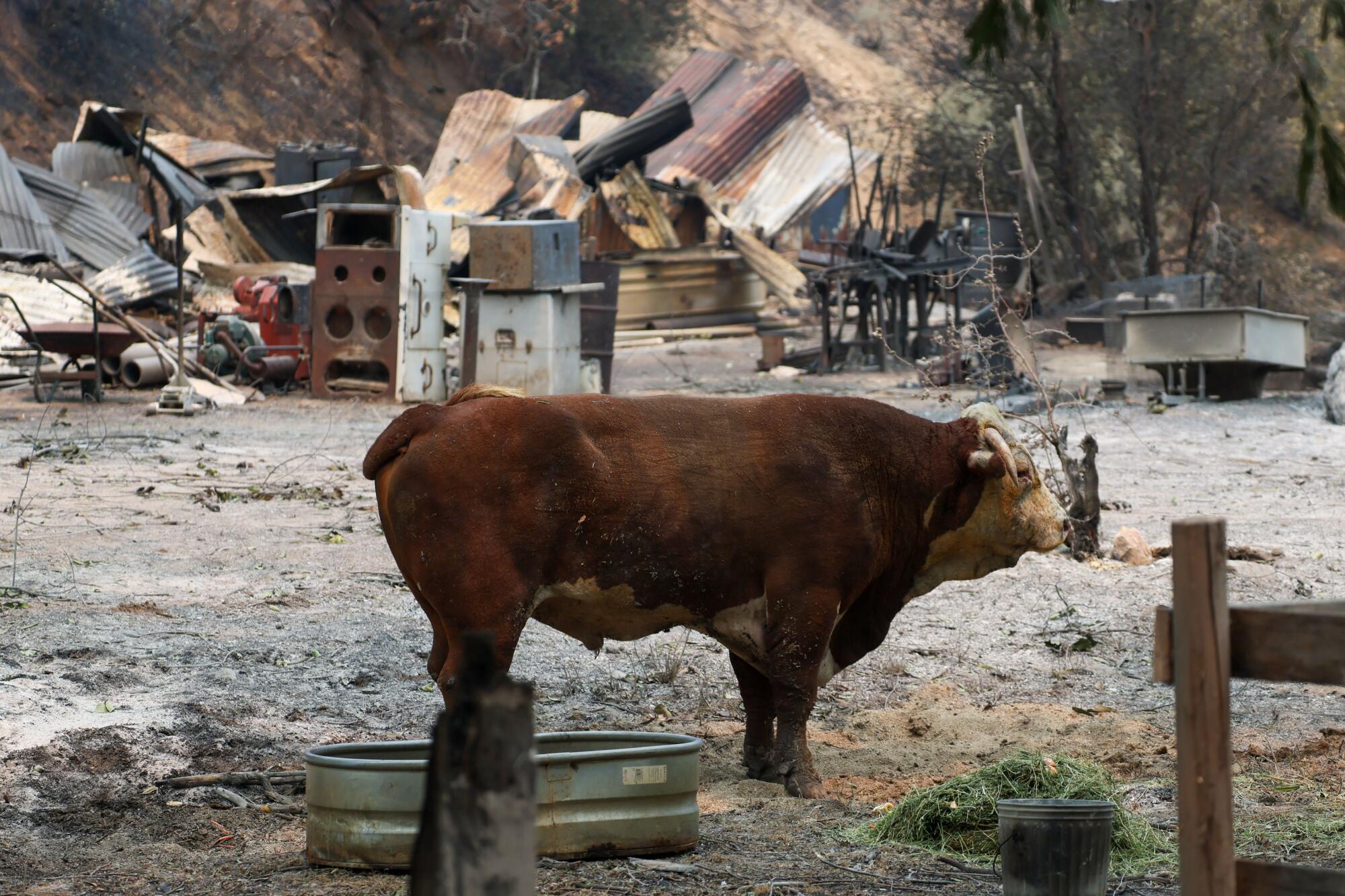
The Borel fire devastated Havilah, a historic mining town in Kern County, in late July.
(Robert Gauthier / Los Angeles Times)
As a dark-skinned Mexican woman, she regularly experienced racism growing up in Southern California— and given that her husband is white, any child she might birth would be biracial, which raises questions about whether and how they would navigate the world differently than she has. But Juliana is an optimist, and she does plan to have one child.
Elena
I spoke to several young women who are addressing the kid question with their dates, potential partners, and long-term boyfriends. Elena, 22, is one of the most certain people I’ve met: She is not having children.
She’s from a Salvadoran immigrant family in which she is one of four children, while her mother was one of 12. Her certainty that stems from both life experiences and climate fears:
“Me being interested in environmental policy cemented my decision to not have kids, but I do have some personal things that I’ve gone through in life that I wouldn’t want my kids going through, like not having a dad. So I feel like it’s best if I just focus on myself and take care of my mom. … I can also spend my time and energy focusing on someone that’s already here.”
Elena brings this conversation up on every first date with any new guy she sees. Given that most of them expect to have families in the future, Elena feels strongly that she does not want a relationship. This has been discouraging for her, but her mind is made up.
Like some of the other people I interviewed, Elena’s feelings about climate change were sparked by environmental studies classes. She says, “[I] started feeling like having kids is definitely not a sustainable thing to do. … I don’t want them to grow up and have to leave their home because of sea level rise. Or be worried because of really weird weather patterns.
“I know that things aren’t going to get better. So why would I want to put a child through that? Even when my sister gave birth to my nephew, I was like, Why? They’re gonna go through so much.”
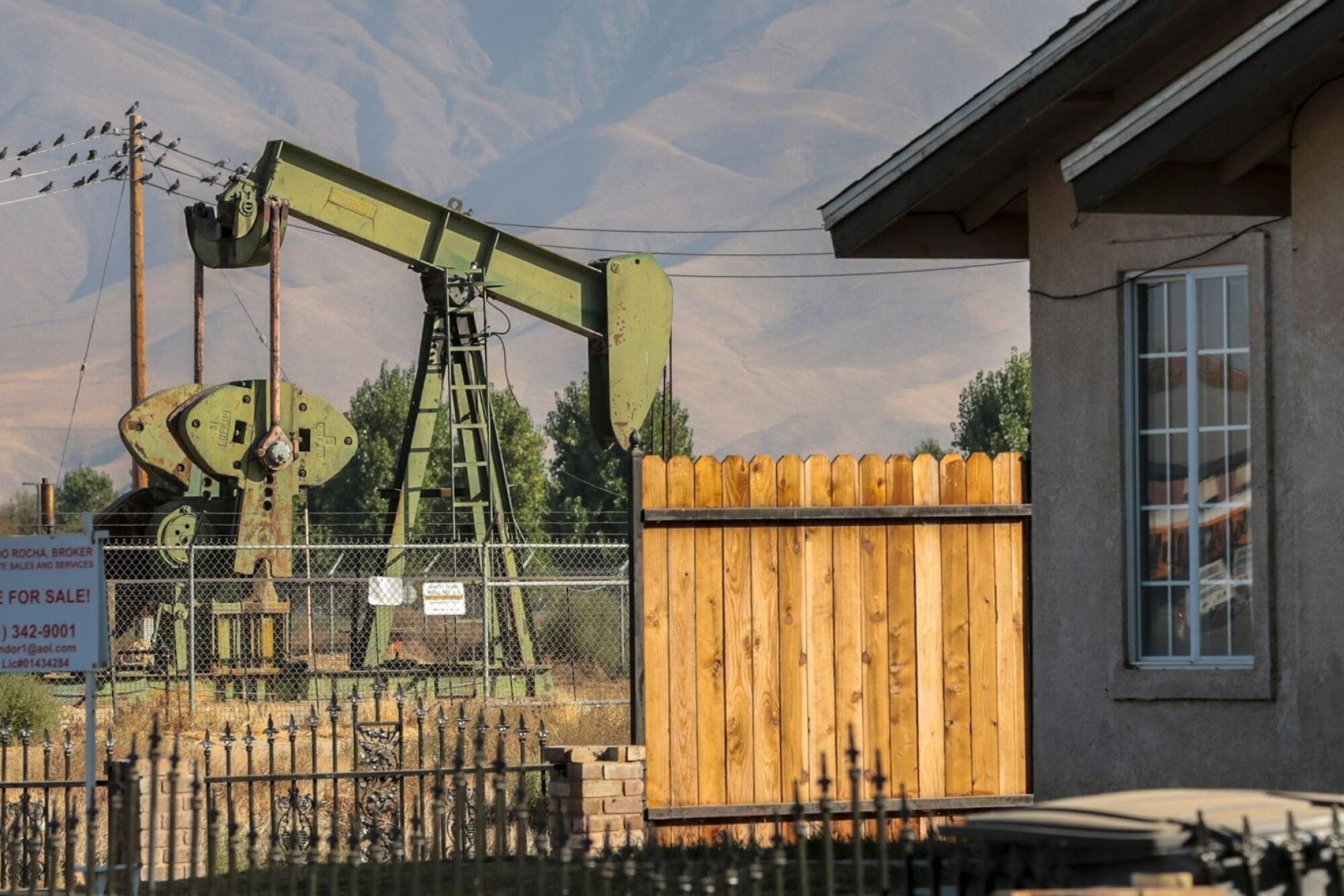
A pump station sits idle near homes in Arvin, Calif., where toxic fumes from a nearby well made residents sick and forced evacuations in November 2019.
(Robert Gauthier / Los Angeles Times)
Veronica
Elena’s close friend Veronica, a 22-year-old from Los Angeles, manages the cultural expectations of a large, immigrant family from Guatemala. “Because of my Hispanic background people are always like, when are you gonna have children, of course you’re having children. It is what it is, right? But now that I’m an adult, I think about it differently. Would my child have a good quality of life? Will they be able to survive?”
She wants to have a child, “but I also want to be mindful of that child. Because it’s not just about having it, it’s about raising it. And being able to sustain it as well.”
For Veronica the everyday environmental concerns link directly to the larger issues shaping climate change: power, who has it, and who doesn’t. Though seemingly distant, intergenerational power imbalances — and older generations’ legacies of generating the emissions that have caused climate change — make her feel that it is unfair for people her age to have to ask the kid question.
She says: “I just think that people in power, whether they believe in climate change or not, it’s not beneficial for them to really do something about it. Because they’re older, it’s not going to affect them the way it affects us. … They have so much money and power it doesn’t affect them the same way. They can buy protection from what the rest of us are going to have to deal with.”
Although these interviews focused primarily on the challenges young people face as they approach reproductive questions, many of them still wanted families of their own. For those who were certain about having children, the reasons were emotional: love, joy, happiness, and hope.
Bobby was clear that he doesn’t plan on having biological children, but he was happy about the thought of fostering in the future and was particularly excited at the thought of his sister having kids.
“I would love to be an uncle,” he said. “Just seeing the next generation, the reason why I’ve been more optimistic about having a foster child of my own, is about being able to see them grow.”
Victoria was excited at the prospect of adopting multiple children.
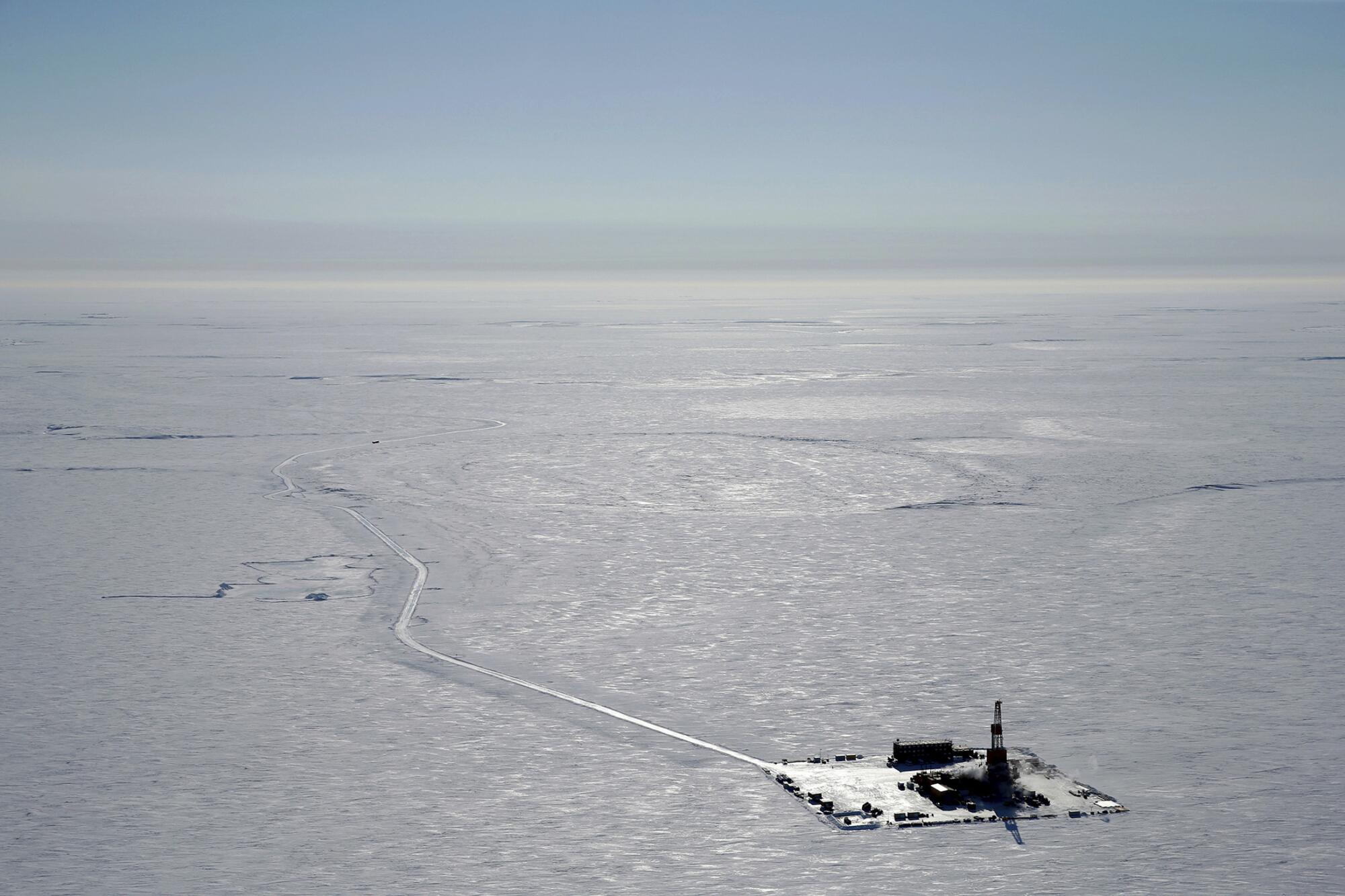
This 2019 aerial photo provided by ConocoPhillips shows an exploratory drilling camp at the proposed site of the Willow oil project on Alaska’s North Slope.
(Associated Press)
“I want to create a space where kids have loving, supportive parents. My parents aren’t perfect, but I know that I grew up in a loving home where they would do anything for my success and protection, and I want to create that for someone else.”
Her sentiments were echoed by Melanie, whose experience living in a racially and gender-diverse family inspires her to want to recreate the same.
She said: “When I look within my own family, we’re very diverse. We’re Black, we’re white, we’re Native American. We’re straight, we’re queer, we’re nonbinary. And we still have compassion for each other and that kind of spills over into compassion for other people that we don’t know. And I think, like, I don’t want to quit. I don’t want to let the bad things dictate how I make my decisions
“The idea of bringing someone into this world and growing them with compassion and love, and making sure they grow up knowing to stand up for other people and stand up for what’s right, that’s a little glimmer of hope.”

Science
What a Speech Reveals About Trump’s Plans for Nuclear Weapons

Within hours of the expiration last week of the final arms control treaty between Moscow and Washington, the State Department sent its top arms diplomat, Thomas G. DiNanno, to Geneva to lay out Washington’s vision for the future. His public address envisioned a future filled with waves of nuclear arms buildups and test detonations.
The views of President Trump’s administration articulated in Mr. DiNanno’s speech represent a stark break with decades of federal policy. In particular, deep in the speech, he describes a U.S. rationale for going its own way on the global ban on nuclear test detonations, which had been meant to curb arms races that in the Cold War had raised the risk of miscalculation, and war.
This annotation of the text of his remarks aims to offer background information on some of the specialized language of nuclear policymaking that Mr. DiNanno used to make his points, while highlighting places where outside experts may disagree with his and the administration’s claims.
What remains unknown is the extent to which Mr. DiNanno’s presentation represents a fixed policy of unrestrained U.S. arms buildups, or more of an open threat meant to spur negotiations toward new global accords on ways to better manage the nuclear age.
Read the original speech.
New York Times Analysis
Next »
1
Established in 1979 as Cold War arsenals grew worldwide, the Conference on Disarmament is a United Nations arms reduction forum made up of 65 member states. It has helped the world negotiate and adopt major arms agreements.
2
In his State Department role, working under Secretary of State Marco Rubio, Mr. DiNanno is Washington’s top diplomat for the negotiation and verification of international arms accords. Past holders of that office include John Bolton during the first term of the George W. Bush administration and Rose Gottemoeller during Barack Obama’s two terms.
3
This appears to be referring to China, which has 600 nuclear weapons today. By 2030, U.S. intelligence estimates say it will have more than 1,000.
4
Here he means Russia, which is conducting tests to put a nuclear weapon into space as well as to develop an underwater drone meant to cross oceans.
New York Times Analysis
« Previous Next »
5
In this year’s federal budget, the Trump administration is to spend roughly $90 billion on nuclear arms, including basic upgrades of the nation’s arsenal and the replacement of aging missiles, bombers and submarines that can deliver warheads halfway around the globe.
6
A chief concern of many American policymakers is that Washington will soon face not just a single peer adversary, as in the Cold War, but two superpower rivals, China and Russia.
New York Times Analysis
« Previous Next »
7
The 1987 Intermediate-Range Nuclear Forces Treaty or I.N.F. banned all weapons capable of traveling between 500 and 5,500 kilometers, or 310 and 3,420 miles, whether armed with nuclear or conventional warheads. The Trump administration is now deploying a number of conventionally armed weapons in that range, including a cruise missile and a hypersonic weapon.
8
The destructive force of the relatively small Russian arms can be just fractions of the Hiroshima bomb’s power, perhaps making their use more likely. The lesser warheads are known as tactical or nonstrategic nuclear arms, and President Vladimir V. Putin of Russia has repeatedly threatened to use them in Ukraine.
9
Negotiators of arms control treaties have mostly focused on long-range weapons because the delivery vehicles and their deadly warheads are considered planet shakers that could end civilization.
New York Times Analysis
« Previous Next »
10
This underwater Russian craft is meant to cross an ocean, detonate a thermonuclear warhead and raise a radioactive tsunami powerful enough to shatter a coastal city.
11
The nuclear power source of this Russian weapon can in theory keep the cruise missile airborne far longer than other nuclear-armed missiles.
12
Russia has conducted test launches for placing a nuclear weapon into orbit, which the Biden administration quietly warned Congress about two years ago.
13
The term refers to the five permanent members of the United Nations Security Council—China, France, Russia, the United Kingdom and the United States.
New York Times Analysis
« Previous Next »
14
A top concern of American officials is that Beijing and Moscow might form an alliance to coordinate their nuclear forces. Their joint program to develop fuel for atom bombs is seen as an indication of this emerging threat.
15
This Trump administration plan is dated November but was made public in December.
16
Released last year, this Chinese government document sought to portray Beijing as a leader in reducing the global threat of nuclear weapons.
17
Typically, arms control treaties have not required countries to destroy warheads so their keepers put them into storage for possible reuse. The United States retains something on the order of 20,000 small atom bombs meant to ignite the larger blasts of hydrogen bombs.
18
An imminent surge centers on the nation’s Ohio-class submarines. The Trump administration has called for the reopening of submarine missile tubes that were closed to comply with the New START limits. That will add as many 56 long-range missiles to the fleet. Because each missile can hold multiple arms, the additional force adds up to hundreds more warheads.
19
This refers to weapons meant for use on a battlefield or within a particular geographic region rather than for aiming at distant targets. It is often seen as synonymous with intermediate-range weapons.
20
Here, the talk turns to the explosive testing of nuclear weapons for safety, reliability and devising new types of arms. The United States last conducted such a test in 1992 and afterwards adopted a policy of using such nonexplosive means like supercomputer simulations to evaluate its arsenal. In 1996, the world’s nuclear powers signed a global ban on explosive testing. A number of nations, including the United States and China, never ratified the treaty, and it never officially went into force.
21
In new detail, the talk addresses what Mr. Trump meant last fall when he declared that he had instructed the Pentagon “to start testing our Nuclear Weapons on an equal basis” in response to the technical advances of unnamed foreign states.
22
Outside experts say the central issue is not whether China and Russia are cheating on the global test ban treaty but whether they are adhering to the U.S. definition. From the treaty’s start in 1996, Washington interpreted “zero” explosive force as the compliance standard but the treaty itself gives no definition for what constitutes a nuclear explosion. Over decades, that ambiguity led to technical disputes that helped block the treaty’s ratification.
23
By definition, all nuclear explosions are supercritical, which means they split atoms in chain reactions that become self-sustaining in sufficient amounts of nuclear fuel. The reports Mr. DiNanno refers to told of intelligence data suggesting that Russia was conducting a lesser class of supercritical tests that were too small to be detected easily. Russian scientists have openly discussed such small experiments, which are seen as useful for assessing weapon safety but not for developing new types of weapons.
24
This sounds alarming but experts note that the text provides no evidence and goes on to speak of preparations, not detonations, except in one specific case.
New York Times Analysis
« Previous
25
The talk gave no clear indication of how the claims about Russian and Chinese nuclear testing might influence U.S. arms policy. But it repeated Mr. Trump’s call for testing “on an equal basis,” suggesting the United States might be headed in that direction, too.
26
The talk, however, ended on an upbeat but ambiguous note, giving no indication of what Mr. DiNanno meant by “responsible.” Even so, the remark came in the context of bilateral and multilateral actions to reduce the number of nuclear arms in the world, suggesting that perhaps the administration’s aim is to build up political leverage and spur new negotiations with Russia, China or both on testing restraints.
Science
Notoriously hazardous South L.A. oil wells finally plugged after decades of community pressure

California Gov. Gavin Newsom announced this week that state oil and gas regulators have permanently closed one of the most infamous drill sites in Los Angeles, bringing an end to a decades-long community campaign to prevent dangerous gas leaks and spills from rundown extraction equipment.
A state contractor plugged all 21 oil wells at the AllenCo Energy drill site in University Park, preventing the release of noxious gases and chemical vapors into the densely populated South Los Angeles neighborhood. The two-acre site, owned by the Archdiocese of Los Angeles, is located across the street from several multifamily apartment buildings and less than 1,000 feet from St. Vincent School.
For years, residents and students had repeatedly complained about acrid odors from the site, with many suffering chronic headaches and nosebleeds. The health concerns prompted a community-driven campaign to shut down the site, with some residents even pleading (unsuccessfully) with the late Pope Francis to intervene.
AllenCo, the site’s operator since 2009, repeatedly flouted environmental regulations and defied state orders to permanently seal its wells.
This month, the California Department of Conservation’s Geologic Energy Management Division (CalGEM) finished capping the remaining unplugged wells with help from Biden-era federal funding.
“This is a monumental achievement for the community who have endured an array of health issues and corporate stalling tactics for far too long,” Newsom said in a statement Wednesday. “I applaud the tireless work of community activists who partnered with local and state agencies to finish the job and improve the health and safety of this community. This is a win for all Californians.”
The land was donated to the Catholic Archdiocese of Los Angeles in the 1950s by descendants of one of the city’s early oil barons. Over the decades, the archdiocese leased the land to several oil companies including Standard Oil of California.
Much of the community outcry over the site’s management occurred after AllenCo took over the site in 2009. The company drastically boosted oil production, but failed to properly maintain its equipment, resulting in oil spills and gas leaks.
In 2013, U.S. Environmental Protection Agency officials became sick while inspecting the site. The federal investigators encountered puddles of crude oil on the facility grounds, as well as caustic fumes emanating from the facility, resulting in violations for air quality and other environmental infractions.
In 2020, CalGEM ordered AllenCo to plug the wells after if determined the company had essentially deserted the site, leaving the wells unplugged and in an unsafe condition. AllenCo ignored the order.
In perhaps the most remarkable events in the site’s history, CalGEM officials in 2022 arrived on the site with a court order and used bolt cutters to enter the site to depressurize the poorly maintained oil wells.
The AllenCo wells were prioritized and plugged this week as part of a CalGEM program to identify and permanently cap high-risk oil and gas wells. Tens of thousands of unproductive and unplugged oil wells have been abandoned across California — many of which continue to leak potentially explosive methane or toxic benzene.
Environmental advocates have long fought for regulators to require oil and gas companies to plug these wells to protect nearby communities and the environment.
However, as oil production declines and fossil fuel companies increasingly become insolvent, California regulators worry taxpayers may have to assume the costs to plug these wells. Federal and state officials have put aside funding to deal with some of these so-called “orphaned” wells, but environmental advocates say it’s not enough. They say oil and gas companies still need to be held to account, so that the same communities that were subjected to decades of pollution won’t have to foot the bill for expensive cleanups.
“This is welcome news that the surrounding community deserves, but there is much more work to be done at a much faster pace,” said Cooper Kass, attorney at the Center for Biological Diversity’s Climate Law Institute. “There are still thousands of unplugged and hazardous idle wells threatening communities across the state, and our legislators and regulators should force polluters, not taxpayers, to pay to clean up these dangerous sites.”
Science
Newsom tells world leaders Trump’s retreat on the environment will mean economic harm

SACRAMENTO — Gov. Gavin Newsom told world leaders Friday that President Trump’s retreat from efforts to combat climate change would decimate the U.S. automobile industry and surrender the future economic viability to China and other nations embracing the transition to renewable energy.
Newsom, appearing at the Munich Security Conference in Germany, urged diplomats, business leaders and policy advocates to forcefully stand up to Trump’s global bullying and loyalty to the oil and coal industry. The California governor said the Trump administration’s massive rollbacks on environmental protection will be short-lived.
“Donald Trump is temporary. He’ll be gone in three years,” Newsom said during a Friday morning panel discussion on climate action. “California is a stable and reliable partner in this space.”
Newsom’s comments came in the wake of the Trump administration’s repeal of the endangerment finding and all federal vehicle emissions regulations. The endangerment finding is the U.S. government’s 2009 affirmation that planet-heating pollution poses a threat to human health and the environment.
Environmental Protection Agency administrator Lee Zeldin said the finding has been regulatory overreach, placing heavy burdens on auto manufacturers, restricting consumer choice and resulting in higher costs for Americans. Its repeal marked the “single largest act of deregulation in the history of the United States of America,” he said.
Scientists and experts were quick to condemn the action, saying it contradicts established science and will put more people in harm’s way. Independent researchers around the world have long concluded that greenhouse gases released by the burning of gasoline, diesel and other fossil fuels are warming the planet and worsening weather disasters.
The move will also threaten the U.S.’s position as a leader in the global clean energy transition, with nations such as China pulling ahead on electric vehicle production and investments in renewables such as solar, batteries and wind, experts said.
Newsom’s trip to Germany is just his latest international jaunt in recent months as he positions himself to lead the Democratic Party’s opposition to Trump and the Republican-led Congress, and to seed a possible run for the White House in 2028. Last month Newsom traveled to the World Economic Forum in Davos, Switzerland, and in November to the U.N. climate summit in Belém, Brazil — mocking and condemning Trump’s policies on Greenland, international trade and the environment.
When asked how he would restore the world’s confidence in the United States if he were to become president, Newsom sidestepped. Instead he offered a campaign-like soliloquy on California’s success on fostering Tesla and the nation’s other top electric vehicle manufacturers as well as being a magnet for industries spending billions of dollars on research and development for the global transition away from carbon-based economies.
The purpose of the Munich conference was to open a dialogue among world leaders on global security, military, economic and environmental issues. Along with Friday’s discussion on climate action, Newsom is scheduled to appear at a livestreamed forum on transatlantic cooperation Saturday.
Andrew Forrest, executive chairman of the Australia-based mining company giant Fortescue, said during a panel Friday his company is proof that even the largest energy-consuming companies in the world can thrive without relying on the carbon-based fuels that have driven industries for more than a century. Fortescue, which buys diesel fuel from countries across the world, will transition to a “green grid” this decade, saving the company a billion dollars a year, he said.
“The science is absolutely clear, but so is the economics. I am, and my company Fortescue is, the industrial-grade proof that going renewable is great economics, great business, and if you desert it, then in the end, you’ll be sorted out by your shareholders or by your voters at the ballot box,” Forrest said.
Newsom said California has also shown the world what can be done with innovative government policies that embrace electric vehicles and the transition to a non-carbon-based economy, and continues to do so despite the attacks and regressive mandates being imposed by the Trump administration.
“This is about economic prosperity and competitiveness, and that’s why I’m so infuriated with what Donald Trump has done,” Newsom said. “Remember, Tesla exists for one reason — California’s regulatory market, which created the incentives and the structure and the certainty that allowed Elon Musk and others to invest and build that capacity. We are not walking away from that.”
California has led the nation in the push toward EVs. For more than 50 years, the state enjoyed unique authority from the EPA to set stricter tailpipe emission standards than the federal government, considered critical to the state’s efforts to address its notorious smog and air-quality issues. The authority, which the Trump administration has moved to rescind, was also the basis for California’s plan to ban the sale of new gasoline-powered cars by 2035.
The administration again targeted electric vehicles in its announcement on Thursday.
“The forced transition to electric vehicles is eliminated,” Zeldin said. “No longer will automakers be pressured to shift their fleets toward electric vehicles, vehicles that are still sitting unsold on dealer lots all across America.”
But the efforts to shut down the energy transition may be too little, too late, said Hannah Safford, former director of transportation and resilience at the White House Climate Policy Office under the Biden administration.
“Electric cars make more economic sense for people, more models are becoming available, and the administration can’t necessarily stop that from happening,” said Safford, who is now associate director for climate and environment at the Federation of American Scientists.
Still, some automakers and trade groups supported the EPA’s decision, as did fossil fuel industry groups and those geared toward free markets and regulatory reform. Among them were the Independent Petroleum Assn. of America, which praised the administration for its “efforts to reform and streamline regulations governing greenhouse gas emissions.”
Ford, which has invested in electric vehicles and recently completed a prototype of a $30,000 electric truck, said in a statement to The Times that it appreciated EPA’s move “to address the imbalance between current emissions standards and consumer choice.”
Toyota, meanwhile, deferred to a statement from Alliance for Automotive Innovation president John Bozzella, who said similarly that “automotive emissions regulations finalized in the previous administration are extremely challenging for automakers to achieve given the current marketplace demand for EVs.”
-

 Alabama1 week ago
Alabama1 week agoGeneva’s Kiera Howell, 16, auditions for ‘American Idol’ season 24
-

 Illinois1 week ago
Illinois1 week ago2026 IHSA Illinois Wrestling State Finals Schedule And Brackets – FloWrestling
-

 Technology1 week ago
Technology1 week agoApple might let you use ChatGPT from CarPlay
-

 Culture7 days ago
Culture7 days agoTry This Quiz on Passionate Lines From Popular Literature
-
News1 week ago
Hate them or not, Patriots fans want the glory back in Super Bowl LX
-

 Technology1 week ago
Technology1 week agoWe found 20 Verge-approved gifts on sale ahead of Valentine’s Day
-

 Politics1 week ago
Politics1 week agoVirginia Dems take tax hikes into overtime, target fantasy football leagues
-

 Politics1 week ago
Politics1 week agoWest Virginia worked with ICE — 650 arrests later, officials say Minnesota-style ‘chaos’ is a choice





















